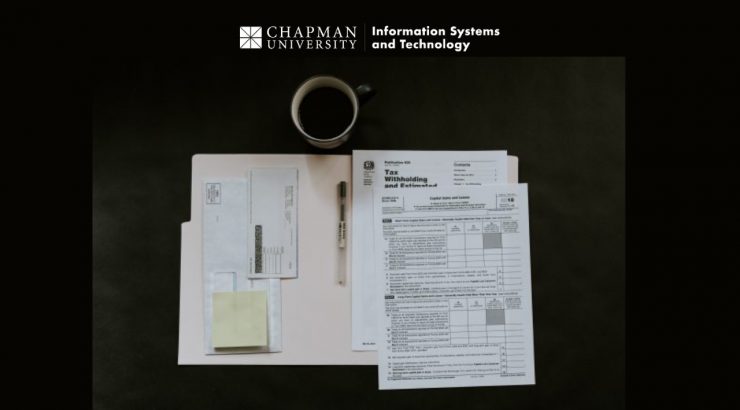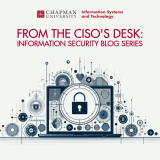
Cyber Security Quarterly Newsletter MAY 2022 - Volume 1 Issue 2
May 13, 2022


Cyber Security Quarterly Newsletter
|
Spring Cleaning TimeWe are halfway into the second quarter of 2022 and that means a new Security Newsletter! With tax season officially over we hope you all stayed away from any seasonal tax scams that may have come your way. With the release of issue 2 of our newsletter, we are keeping up with our New Year’s resolution to help keep our staff safer and more secure. Hope you are all going strong on keeping your resolutions! If you are falling behind, now is the best time to remind yourself to stick with it. In this issue, we will highlight additional seasonal and scam emails that you might find landing in your inbox and some new tactics and techniques that we are seeing malicious actors use against our Chapman users. |
FACTS AND FIGURES
|
| SECURITY TIP – THINK BEFORE YOU CLICK (MFA SPAMMING)
With the implementation of multi-factor authentication (MFA) Chapman took a big stride in protecting our accounts against compromise. However, attackers are always looking for new ways to circumvent security safeguards; this time by spamming the MFA process. You may get random (sometime multiple) MFA prompts via app or phone call that you did not submit. This can come randomly during the day or in the middle of the night, interrupting your beauty sleep (and I need mine just to look halfway normal). Remember to deny those requests and check where they came from. You can review your MFA sign-in log at mysignins.microsoft.com.This will further help protect your account and keep the bad guys out. If you continue to get them non-stop, reach out to infosec and let us know so we can investigate at infosec@chapman.edu |
| DID YOU KNOW?!?
Just in April 2022 5,084,632 spam emails and 188,897 phishing emails were blocked before hitting Chapman email accounts. That is approximately the population of South Carolina! |
| SCAMS TO LOOK OUT FOR:
Charity Donation Emails
Shared Cloud Documents Gone are the days of having to save your documents onto a floppy disk (did I just give away my age?) or the need to use a USB drive to transfer and share files with co-workers, family, or friends. By using cloud storage such as OneDrive, Google Drive, iCloud Storage, etc., you can quickly and easily share your files with others or have easy access for yourself. However, scammers can share malicious documents with you to trick you into downloading malicious files or take you to malicious sites. Be mindful when opening documents shared with you:
Remember: Chapman provides examples of type of various scams & phishing attacks at chapman.edu/scams. **Infosec is always looking for feedback. If you have comments/suggestions/items you would like to see focused on in the newsletter, please email us at infosec@chapman.edu** |
Please note these emails will show with an external email banner but are legitimate communications sent via KnowBe4.
All volumes of the newsletter will be archived on the Information Systems and Technology blogsite.
blogs.chapman.edu/information-systems/2022/02/10/cyber-security-quarterly-newsletter
